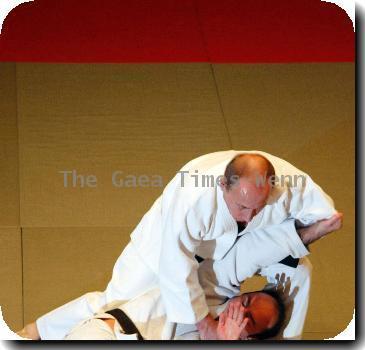Kyrgyz president refuses to admit defeat despite bloody uprising and formation of interim govt
By Peter Leonard, APThursday, April 8, 2010
Kyrgyz president refuses to admit defeat or resign
BISHKEK, Kyrgyzstan — The president of Kyrgyzstan insisted Thursday that he is not admitting defeat and he will not resign despite a bloody uprising and the formation of an interim government by the opposition.
Resistance from President Kurmanbek Bakiyev, who has fled the northern capital of Bishkek for the south, could raise the prospect of continued instability in the impoverished Central Asian nation, home to both a U.S. air base key to the Afghan war and a Russian military facility.
This mountainous former Soviet republic erupted Wednesday after angry protesters stormed government buildings in Bishkek and riot police fired straight into crowds, leaving dozens dead and hundreds wounded.
“I don’t admit defeat in any way,” Bakiyev said on the Ekho Moskvy radio station, but also recognized that “even though I am president, I don’t have any real levers of power.”
Earlier Thursday, opposition leader Roza Otunbayeva said parliament was dissolved and she would head an interim government that would rule for six months until elections were held. She said the opposition controlled four of the country’s seven provinces and urged Bakiyev to resign.
“His business in Kyrgyzstan is finished,” she said.
She also said there were no immediate plans to revisit the current one-year lease on the Manas U.S. air base, which runs out in July. U.S. military officials said Kyrgyzstan halted flights for 12 hours Wednesday at Manas during the uprising, and were evasive Thursday when asked if flights had resumed.
All U.S. military personnel were restricted to the base as a security measure for the second day, a senior U.S. defense official in Washington said Thursday on condition of anonymity because he was not authorized to speak about it on the record.
There are about 1,100 U.S. military there as well as contingents from Spain and France, also supporting NATO operation in Afghanistan.
Bakiyev was emphatic Thursday that he was still the elected leader of the nation of 5 million people that has been courted by China, Russia and the U.S. for its strategic location.
“I do not intend to relinquish power. I see no point,” he said, adding that his re-election nine months ago proved he still had popular support.
Even though his security forces fired into crowds of demonstrators a day ago, killing dozens and wounding hundreds, Bakiyev seemed to rule out further violence.
“You think the president elected by the people will take up arms against the people? What nonsense,” he said.
Asked why he fled Bishkek, he said: “I wouldn’t have left, but when they started firing on my windows, it was only by chance that I avoided injury.”
Otunbayeva, the former foreign minister, said the president was in the southern region of Jalal-Abad, the heart of his political stronghold. This raised concerns that Bakiyev could try to secure his own survival by exploiting the country’s traditional split between the more urban north and the rural south.
Eyewitnesses in southern Kyrgyzstan told The Associated Press that the situation there was tense and unstable, and the region had both armed men who appeared to be still supporting Bakiyev along with opposition supporters.
The new interim defense minister, however, said the armed forces have joined the opposition and will not be used against protesters.
“Special forces and the military were used against civilians in Bishkek, Talas and other places,” Ismail Isakov said. “This will not happen in the future.”
Although the opposition has previously voiced objection to Manas, Otunbayeva said there were no plans yet to review the lease and her government would meet U.S. diplomats for talks in Bishkek.
“Give us time, it will take time for us to understand and fix the situation,” Otunbayeva said.
Officials at Manas were coy Thursday about operations at the base.
“(We at) Manas have taken all appropriate measures to continue to support operations in Afghanistan,” said U.S. Air Force Maj. Rickardo Bodden, a public affairs officer. He refused to elaborate for security reasons.
In 2009, Kyrgyzstan said U.S. forces would have to leave Manas, a decision made shortly after Russia granted Kyrgyzstan more than $2 billion in aid and loans. The government later reversed its stance and signed a one-year deal with the U.S. that raised the rent to about $63 million a year from $17 million.
The U.S. is also paying $67 million for airport improvements and navigation systems and another $51.5 million to combat drug trafficking and terrorism and promote economic development.
Leonid Bondarets, who has been affiliated with the Sweden-based Central Asia and the Caucasus think tank, said as long as Bakiyev did not formally resign, there is room for trouble.
“It’s hard to predict what is going to happen because Bakiyev hasn’t stepped down,” Bondarets said in a telephone interview from Bishkek. “The situation is still tense.”
Kyrgyzstan, which shares a 533-mile (858-kilometer) border with China, is also a gateway to other energy-rich Central Asian countries where China, Russia and the U.S. are competing fiercely for dominance. It is a predominantly Muslim country, but it has remained secular.
In a tentative sign that Russia may lend its support to the opposition forces, Prime Minister Vladimir Putin called Otunbayeva on Thursday to talk. Any suggestion that Russia is backing the new leadership adds to the pressure on Bakiyev to step down.
Russia sent in 150 paratroopers to its base to ensure the safety of the 400 military personnel and their families there, Russian state media reported.
In Bishkek, most of the government buildings in the capital, as well as Bakiyev’s houses, have been looted or set on fire and two major markets were burned down. A paper portrait of Bakiyev at government headquarters was smeared with red paint. Obscenities about him were spray-painted on buildings nearby.
Since coming to power in 2005 amid street protests known as the Tulip Revolution, Bakiyev had ensured a measure of stability, but the opposition said he did so at the expense of democratic standards while enriching himself and his family.
He gave his relatives, including his son, top government and economic posts and faced the same accusations of corruption and cronyism that led to the ouster of his predecessor, Askar Akayev.
Otunbayeva blamed Bakiyev for the week’s violent clashes.
“Yesterday’s events were a response to aggression, tyranny and a crackdown on dissenters,” she said. “All the people who were killed and wounded are victims of this regime.”
The Health Ministry said at least 74 people were killed and 400 people hospitalized in clashes nationwide Wednesday.
Associated Press writers Leila Saralayeva and Yuras Karmanau in Bishkek, Anita Chang in Beijing, Deborah Seward in Paris and Lynn Berry, Mansur Mirovalev, Nataliya Vasilyeva and David Nowak in Moscow contributed to this report.
Tags: Afghanistan, Asia, Bishkek, Central Asia, China, East Asia, Eastern Europe, Europe, Greater China, Kyrgyzstan, Military Affairs, Military Facilities, North America, Parliamentary Elections, Political Resignations, Protests And Demonstrations, Roza otunbayeva, Russia, United States, Vladimir Putin

